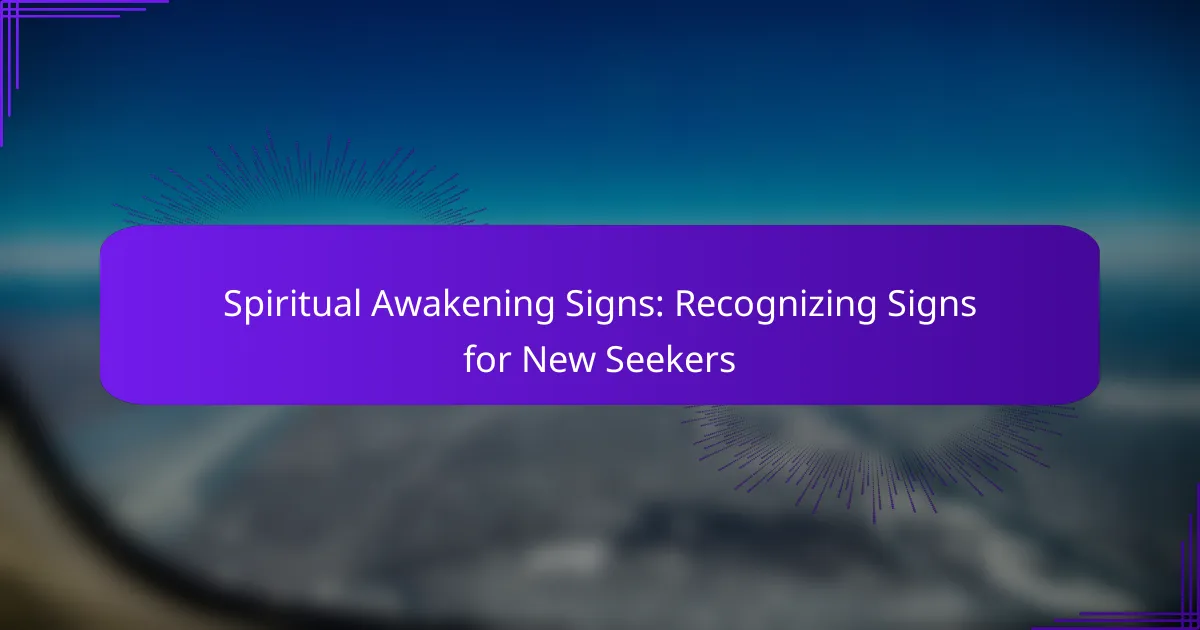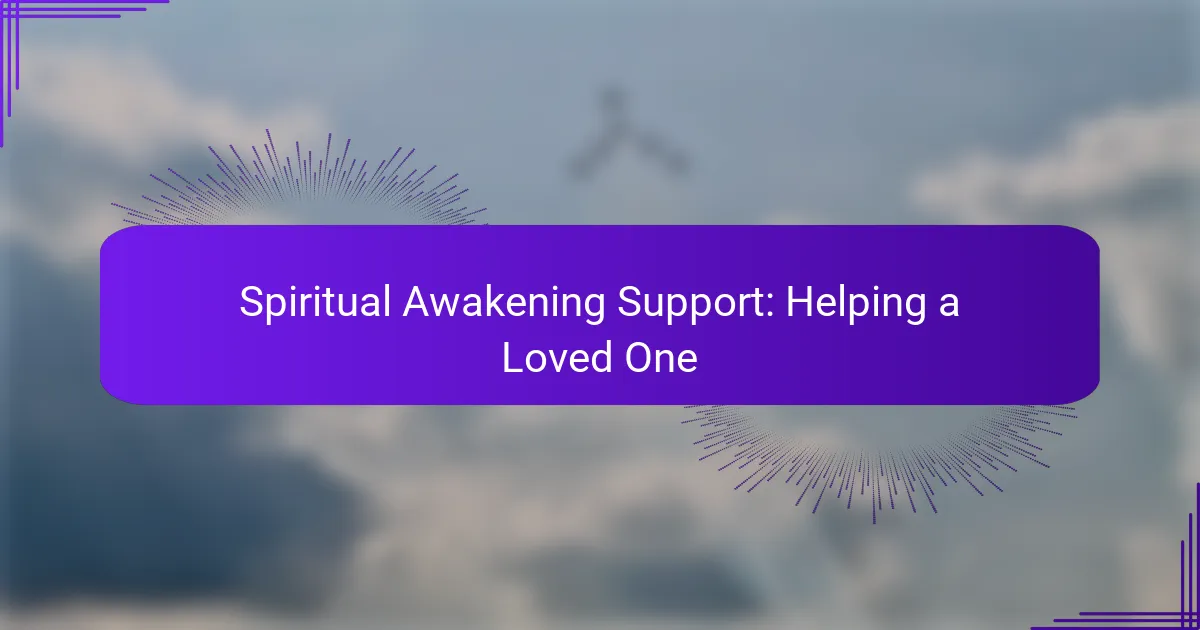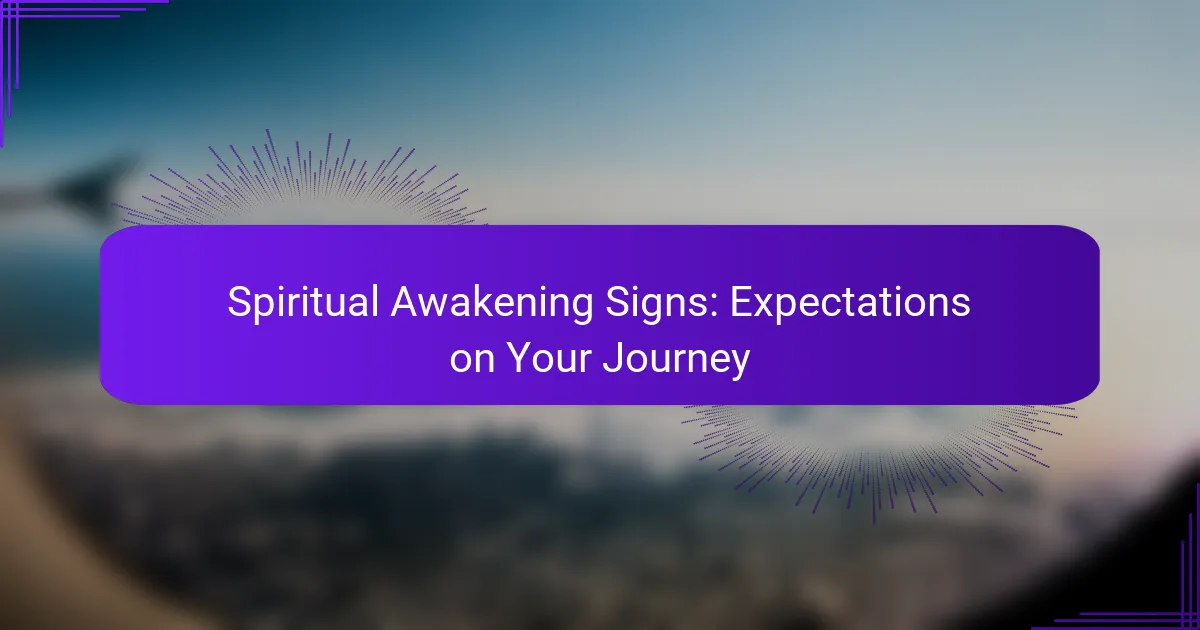For new seekers on their spiritual journey, recognizing the signs of spiritual awakening is essential for personal growth and self-discovery. These signs often manifest as shifts in thoughts, emotions, and perceptions, leading to heightened awareness and a deeper sense of purpose. By being attentive to these changes and engaging in practices like mindfulness and self-reflection, individuals can navigate their path toward greater connection with themselves and the universe.

What are the signs of spiritual awakening for new seekers?
New seekers often experience various signs of spiritual awakening that indicate a shift in consciousness. Recognizing these signs can help individuals navigate their journey toward greater self-awareness and connection with the universe.
Heightened intuition
Heightened intuition is a common sign of spiritual awakening, where individuals may start to trust their gut feelings more than before. This can manifest as an increased ability to sense the emotions or intentions of others, leading to more informed decisions.
To cultivate this intuition, pay attention to your inner voice and practice mindfulness. Journaling your thoughts and feelings can also help clarify intuitive insights over time.
Increased empathy
As spiritual awakening progresses, many experience increased empathy, feeling a deeper connection to the emotions and struggles of others. This can lead to a stronger desire to help and support those around you.
To manage this heightened empathy, set healthy boundaries to protect your emotional well-being. Engaging in self-care practices, such as meditation or spending time in nature, can help balance your sensitivity.
Desire for solitude
A strong desire for solitude often accompanies spiritual awakening, as individuals seek time alone to reflect and process their experiences. This need for quiet can be essential for personal growth and understanding.
Embrace this desire by creating a dedicated space for solitude, whether through meditation, reading, or simply enjoying nature. Allow yourself to recharge without guilt, recognizing it as a vital part of your journey.
Changes in sleep patterns
Changes in sleep patterns are frequently reported during spiritual awakenings, including insomnia or vivid dreams. These alterations can be a result of increased energy or shifts in consciousness.
To address sleep disturbances, establish a calming bedtime routine and limit screen time before bed. Consider practices such as yoga or deep breathing exercises to promote relaxation and improve sleep quality.
Synchronicities
Experiencing synchronicities, or meaningful coincidences, is another sign of spiritual awakening. These occurrences often feel like messages from the universe, guiding you toward your path.
To recognize and appreciate synchronicities, keep a journal of these events and reflect on their significance. This practice can enhance your awareness and deepen your connection to the spiritual realm.

How can new seekers recognize these signs?
New seekers can recognize signs of spiritual awakening by being attentive to shifts in their thoughts, emotions, and perceptions. Common indicators include heightened awareness, changes in relationships, and a deepening sense of purpose.
Self-reflection practices
Self-reflection practices involve taking time to examine your thoughts, feelings, and experiences. This can be done through quiet contemplation or structured exercises that encourage introspection. Consider setting aside a few minutes daily to reflect on your day and identify any moments of insight or emotional shifts.
To enhance self-reflection, ask yourself open-ended questions such as, “What am I feeling right now?” or “What lessons have I learned recently?” This can help clarify your inner experiences and reveal signs of awakening.
Mindfulness meditation
Mindfulness meditation is a powerful tool for recognizing signs of spiritual awakening. By focusing on the present moment, you can cultivate awareness of your thoughts and emotions without judgment. Start with short sessions of 5 to 10 minutes, gradually increasing the duration as you become more comfortable.
During meditation, pay attention to any sensations or insights that arise. Notice if you experience a sense of connectedness or shifts in your perspective, as these can be indicators of spiritual growth.
Journaling experiences
Journaling is an effective way to document your spiritual journey and recognize patterns over time. Set aside time each day or week to write about your thoughts, feelings, and any significant experiences. This practice can help you track changes and identify signs of awakening.
When journaling, focus on specific events that triggered emotional responses or insights. Use prompts like “What have I learned about myself this week?” or “What moments felt particularly meaningful?” This can provide clarity and reinforce your understanding of your spiritual path.

What practices support spiritual awakening?
Practices that support spiritual awakening often involve mindfulness, self-reflection, and connection to the universe. Engaging in these activities can help individuals recognize their inner selves and foster a deeper understanding of their spiritual journey.
Yoga and breathwork
Yoga and breathwork are powerful tools for enhancing spiritual awakening. These practices promote physical and mental well-being while encouraging mindfulness and presence. Regular sessions can help individuals connect with their bodies and quiet their minds, making it easier to explore spiritual insights.
To get started, consider incorporating a daily routine of yoga poses combined with focused breathing exercises. Aim for at least 20-30 minutes each session, gradually increasing the duration as you become more comfortable. Look for local classes or online resources that resonate with you.
Nature immersion
Immersing yourself in nature can significantly support spiritual awakening by fostering a sense of connection to the earth and the universe. Spending time outdoors helps to clear the mind and encourages introspection, allowing for deeper contemplation and insight.
Try to spend time in natural settings like parks, forests, or beaches at least once a week. Engage in activities such as hiking, meditating, or simply observing your surroundings. This can enhance your awareness and help you feel more grounded in your spiritual journey.
Energy healing techniques
Energy healing techniques, such as Reiki or chakra balancing, can facilitate spiritual awakening by clearing blockages and promoting the flow of energy throughout the body. These practices aim to harmonize the mind, body, and spirit, allowing for a more profound connection to one’s true self.
If you’re interested in energy healing, consider seeking a certified practitioner or exploring self-healing methods. Start with simple techniques like meditation focused on energy centers, and gradually incorporate more advanced practices as you gain confidence. Be open to the experience and trust your intuition throughout the process.
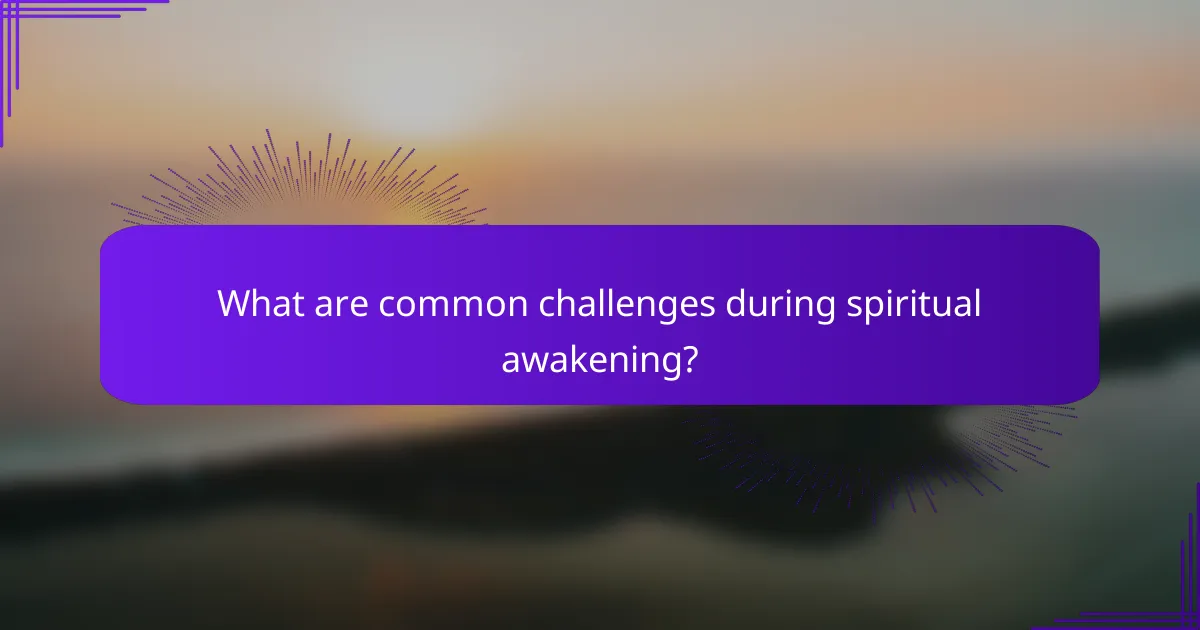
What are common challenges during spiritual awakening?
Common challenges during spiritual awakening include emotional upheaval, feelings of disconnection, and questioning long-held beliefs. These experiences can be intense and disorienting, but recognizing them can help individuals navigate their journey more effectively.
Emotional upheaval
Emotional upheaval is a frequent challenge during spiritual awakening. Individuals may experience heightened emotions, mood swings, or a sense of overwhelming sadness or joy. This emotional rollercoaster can be confusing, as it often feels disconnected from external circumstances.
To manage emotional upheaval, practice mindfulness and self-compassion. Journaling can also help process feelings and identify patterns. Seeking support from friends or spiritual communities can provide a sense of grounding during turbulent times.
Feeling disconnected
Feeling disconnected is another common challenge faced during spiritual awakening. Many individuals report a sense of isolation from friends, family, or even their previous selves. This disconnection can stem from a shift in values or perspectives, making it difficult to relate to others.
To cope with feelings of disconnection, engage in activities that resonate with your new beliefs, such as meditation or joining spiritual groups. Building connections with like-minded individuals can foster a sense of belonging and support your journey.
Questioning beliefs
Questioning beliefs is a natural part of spiritual awakening. As individuals explore new ideas and perspectives, they may find themselves reevaluating previously held convictions. This process can lead to uncertainty and discomfort as old beliefs are challenged.
To navigate this questioning phase, approach it with curiosity rather than fear. Allow yourself to explore different philosophies and practices without pressure to commit immediately. Engaging in discussions or reading diverse spiritual literature can provide clarity and insight.
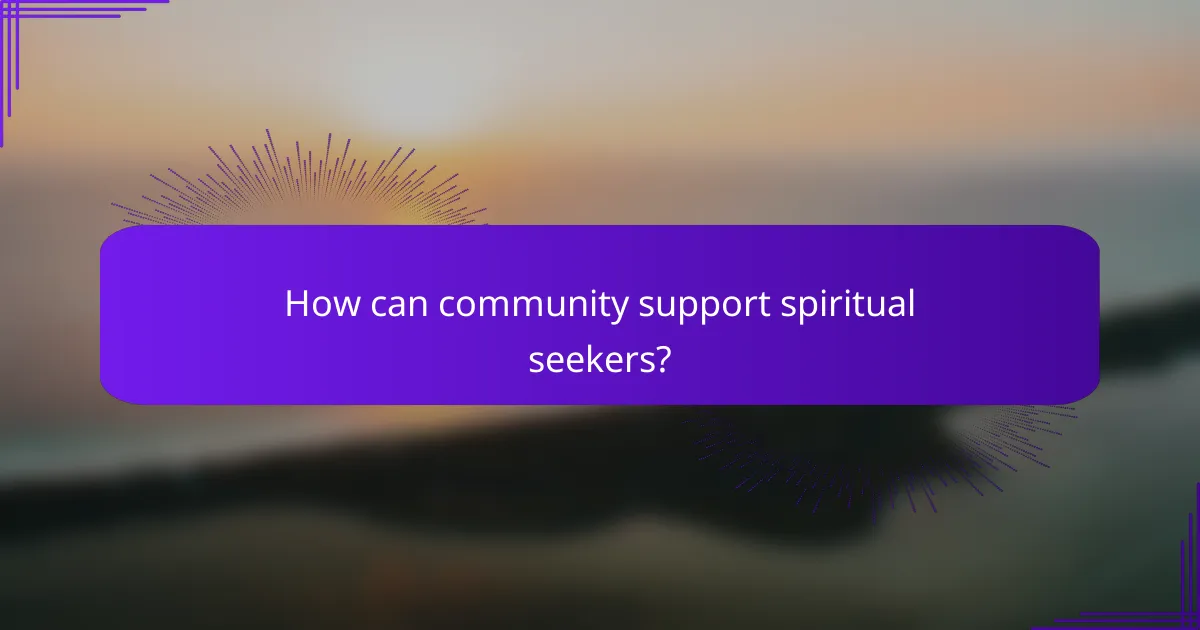
How can community support spiritual seekers?
Community can significantly enhance the journey of spiritual seekers by providing connection, shared experiences, and encouragement. Engaging with others on similar paths fosters a sense of belonging and can deepen one’s understanding of spiritual concepts.
Joining spiritual groups
Joining spiritual groups offers seekers a platform to connect with like-minded individuals. These groups often meet regularly, creating a supportive environment where members can share insights, challenges, and personal growth experiences.
When selecting a group, consider its focus—some may emphasize meditation, while others might explore philosophical discussions or specific spiritual practices. Look for groups that align with your interests and values to maximize your engagement.
Be open to participating actively, as sharing your journey can enrich both your experience and that of others. However, ensure the group maintains a respectful and inclusive atmosphere to foster genuine connections.
Participating in workshops
Participating in workshops can provide structured learning and hands-on experiences for spiritual seekers. These events often feature experienced facilitators who guide participants through various practices, such as meditation, energy healing, or mindfulness techniques.
Workshops can vary in length from a few hours to several days, allowing for different levels of commitment. Look for workshops that offer practical tools and techniques you can integrate into your daily life.
Before enrolling, research the facilitator’s background and the workshop’s content to ensure it aligns with your spiritual goals. Engaging with fellow participants can also lead to valuable connections and ongoing support in your spiritual journey.
